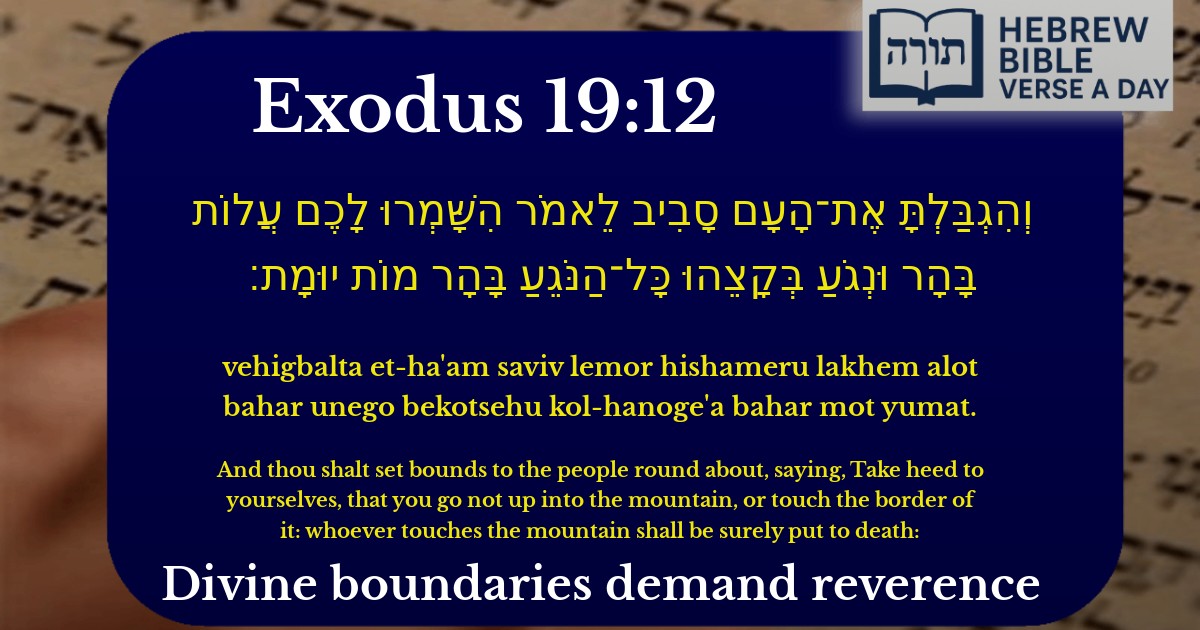Join Our Newsletter To Be Informed When New Videos Are Posted
Join the thousands of fellow Studends who rely on our videos to learn how to read the bible in Hebrew for free!
Hebrew Text
וְהִגְבַּלְתָּ אֶת־הָעָם סָבִיב לֵאמֹר הִשָּׁמְרוּ לָכֶם עֲלוֹת בָּהָר וּנְגֹעַ בְּקָצֵהוּ כָּל־הַנֹּגֵעַ בָּהָר מוֹת יוּמָת׃
English Translation
And thou shalt set bounds to the people round about, saying, Take heed to yourselves, that you go not up into the mountain, or touch the border of it: whoever touches the mountain shall be surely put to death:
Transliteration
Vehigbalta et-ha'am saviv lemor hishameru lakhem alot bahar unego bekotsehu kol-hanoge'a bahar mot yumat.
Hebrew Leining Text
וְהִגְבַּלְתָּ֤ אֶת־הָעָם֙ סָבִ֣יב לֵאמֹ֔ר הִשָּׁמְר֥וּ לָכֶ֛ם עֲל֥וֹת בָּהָ֖ר וּנְגֹ֣עַ בְּקָצֵ֑הוּ כׇּל־הַנֹּגֵ֥עַ בָּהָ֖ר מ֥וֹת יוּמָֽת׃
וְהִגְבַּלְתָּ֤ אֶת־הָעָם֙ סָבִ֣יב לֵאמֹ֔ר הִשָּׁמְר֥וּ לָכֶ֛ם עֲל֥וֹת בָּהָ֖ר וּנְגֹ֣עַ בְּקָצֵ֑הוּ כׇּל־הַנֹּגֵ֥עַ בָּהָ֖ר מ֥וֹת יוּמָֽת׃
🎵 Listen to leining
Parasha Commentary
📚 Talmud Citations
This verse is quoted in the Talmud.
📖 Shabbat 88b
The verse is referenced in the context of discussing the giving of the Torah at Mount Sinai and the boundaries set around the mountain to prevent the people from approaching it.
📖 Yoma 4b
The verse is mentioned in a discussion about the sanctity of Mount Sinai and the precautions taken to ensure the people did not approach it improperly.


The Sanctity of Har Sinai
This verse (Shemot 19:12) establishes strict boundaries around Har Sinai during Matan Torah (the giving of the Torah). Rashi explains that these boundaries were necessary to prevent the people from ascending the mountain, as its holiness required separation. The mountain had become sanctified by Hashem's presence, making it akin to the Mikdash (Sanctuary), where unauthorized entry is forbidden.
The Severity of the Prohibition
The Torah emphasizes the gravity of this prohibition with the phrase "כָּל־הַנֹּגֵעַ בָּהָר מוֹת יוּמָת" ("whoever touches the mountain shall surely be put to death"). The Rambam (Hilchot Sanhedrin 18:6) derives from this that even accidental trespassers were liable for death, underscoring the mountain's supreme sanctity at that moment. The Ibn Ezra adds that this was a unique hora'at sha'ah (temporary decree) for Matan Torah, not a general precedent.
Symbolism of the Boundaries
Halachic Implications
The Ramban connects this prohibition to the broader concept of issur biah (forbidden entry) in holy places. Just as Har Sinai was off-limits, so too are certain areas of the Beit HaMikdash restricted to those unprepared or unworthy. The Sefer HaChinuch (Mitzvah 152) extends this idea to respecting all sacred spaces and objects.